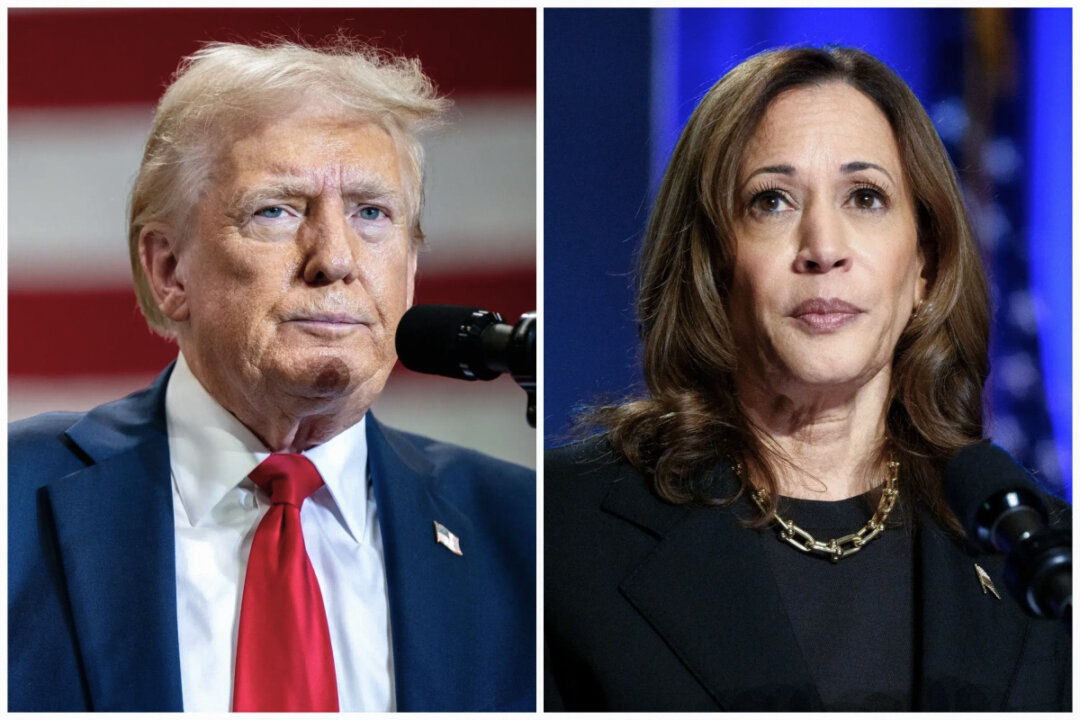The level of concern over the economy is the highest recorded since October 2008, when the country was in the grips of a major financial crisis.
The economy ranks as the most crucial issue for voters in the 2024 presidential election, with a new Gallup poll indicating that it’s the only issue that more than 50 percent of registered voters say is “extremely important” in influencing their choice.
The poll, released on Oct. 9, shows that 52 percent of voters surveyed in the last two weeks of September said that the economy was “extremely important” when determining their choice for U.S. president, while another 38 percent saw it as “very important.”
Combined, this suggests that the economy will be a key factor for approximately 90 percent of voters in the upcoming election, which pits Democratic nominee Vice President Kamala Harris against Republican candidate former President Donald Trump, who leads on economic perceptions among voters.
The Gallup poll shows that 54 percent of voters believe Trump would better manage the economy compared to 45 percent who think Harris would do a better job on economic issues.
The level of concern over the economy is the highest recorded since October 2008, when the country was in the grips of a major financial crisis. At the time, 55 percent of voters said the economy was “extremely important” in their presidential choice.
Despite Trump enjoying a significant advantage over Harris in terms of who voters think would do a better job on the key issue of the economy, the two poll similarly when it comes to overall voter agreement with each candidate’s respective policy positions. Among registered voters, 49 percent agree with Trump’s stance on issues that matter most to them, while 50 percent disagree. Harris’s numbers are similar, with 47 percent agreeing and 52 percent disagreeing with her positions.
The dominance of the economy as a key voting issue reveals significant partisan divides, however.
The Gallup poll shows that 66 percent of Republicans and Republican-leaning independents considered the economy “extremely important” to their vote, while only 36 percent of Democratic and Democratic-leaning independent voters expressed that sentiment.
The difference narrows when combining “extremely important” and “very important” responses, with 98 percent of Republicans and Republican-leaning independents and 82 percent of Democratic and Democratic-leaning independents holding one of those views with respect to the importance of the economy in how they would cast their ballots.
The picture painted by the Gallup poll of the historically elevated importance of the economy in this year’s presidential election is reinforced by a September survey jointly conducted by the Harvard Center for American Political Studies and the Harris Poll.
It showed that 63 percent of voters believed the U.S. economy is on the wrong track, while 62 percent characterized it as weak. Nearly half (48 percent) of voters said their personal financial situation is getting worse, while 42 percent named inflation as the most important issue facing the country today.
A recent analysis of Harris’s and Trump’s policy proposals shows that the two candidates offer different economic visions, with Trump focusing on reducing inflation through energy production and cutting wasteful government spending, while Harris emphasizes consumer protections to tackle rising costs.
Trump’s plan includes aggressive trade policies and measures to bring supply chains back to the United States, while Harris advocates for raising the minimum wage and increasing taxes on the wealthy to strengthen Social Security and Medicare.
The former president supports using tariffs, including a proposed 60 percent tariff on Chinese imports and a 10 percent universal tariff on all goods entering the United States, in a bid to protect domestic industries.
Harris, on the other hand, has pledged to boost small-business growth by expanding tax deductions for startups, while promising to continue the Biden administration’s efforts to revitalize U.S. manufacturing.
Trump’s pledge to boost the economy by ending global conflicts comes as insurance market Lloyd’s of London estimates potential global economic losses of $14.5 trillion over five years if a major geopolitical conflict were to disrupt trade patterns.
Such conflicts could severely damage infrastructure and compromise shipping lanes, which handle over 80 percent of global imports and exports, Lloyd’s said in an Oct. 9 statement, underscoring the significant economic risks tied to geopolitical instability.

